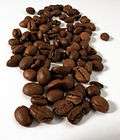Specialty Coffee Association of Indonesia
The Specialty Coffee Association of Indonesia (SCAI) is a trade association that represents farmers, exporters, roasters and retailers of Coffea arabica in Indonesia.[1]
Indonesian coffee production
Indonesia is the fourth largest exporter of coffee in the world, with production of 420,000 metric tons of coffee in 2007. Of this total, 271,000 tons were exported and 148,000 tons were consumed domestically. Of the exports, 25% are Coffea arabica and the balance is Coffea canephora.[2] The specialty coffee market is the best opportunity for growth in Indonesia's coffee industry. In the U.S., specialty coffee has increased its market share from 1% to 20% in the last 25 years.[3]
Activities of SCAI
SCAI members export 45% of Indonesia’s Arabica coffee. The value of this coffee is more than $65 million, based on an average Free On Board price for Indonesia specialty coffee of $3,200 per metric ton. More than 8,000 Indonesian farmers have joined SCAI through their cooperatives. Coffee retailers who are members of SCAI are active in barista championships, as judges and participants.[4]
Arabica coffee from Indonesia has been an integral part of many coffee blends for hundreds of years. Mocha Java, which is a blend of Yemeni and Indonesian coffee, was developed in the 18th century. However, unscrupulous dealers are blending Indonesian coffee with lower priced coffee from other origins, confusing the marketplace. SCAI is ending this practice by supporting the creation of geographical indications for Indonesia’s Arabica coffee origins.
SCAI is also working with companies from other countries to improve the quality of Indonesia’s specialty coffee. In July, 2008, SCAI hosted the Director of the Coffee Quality Institute (CQI), who provided training on quality certification of coffee.[5] SCAI actively collaborates with key institutions in the coffee industry. In May, 2008, SCAI signed a Letter of understanding with the International Relations Council of the Specialty Coffee Association of America.[6]
See also
References
- ↑ "The Diverse Coffees of Indonesia". Specialty Coffee Association of Indonesia. Archived from the original on August 1, 2008. Retrieved 2008-08-08.
- ↑ "Trade statistics". International Coffee Organization. Retrieved 2008-08-08.
- ↑ Lingle, T: The State of the Specialty Coffee Industry, Tea and Coffee Trade Journal, July, 2007 Retrieved 2008-08-08
- ↑ "Supporting organizations". Asia Barista Championship. Retrieved 2008-08-08.
- ↑ "Cupping with Mr. Ted Lingle". Brother Baba Budan. Retrieved 2008-08-08.
- ↑ AMARTA Newsletter, A New Trade Association Promotes Indonesia’s Specialty Coffee in the United States, May 2008: Retrieved on 2008-08-08
